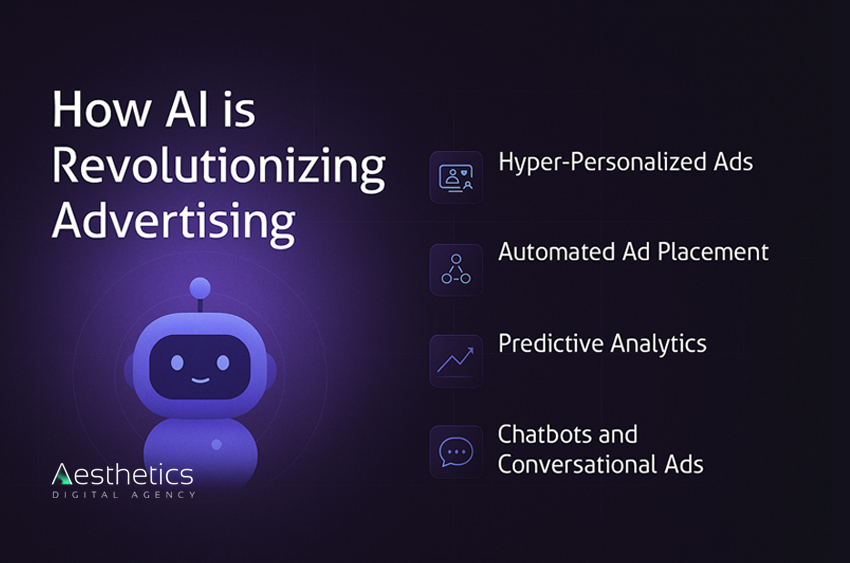In today’s rapidly evolving digital landscape, artificial intelligence (AI) has moved beyond buzzword status to become a powerful driver of transformation across industries. Nowhere is this shift more evident than in e-commerce advertising, where AI is redefining how businesses attract, engage, and convert customers.
From personalized product recommendations to real-time ad optimization, AI is enabling smarter, data-driven decisions that boost performance and efficiency. In this blog, we’ll discuss how AI is reshaping e-commerce, transforming advertising, enhancing overall business strategies, and how you can use it to stay ahead in an increasingly competitive market.
How AI is Revolutionizing E-commerce
AI is reshaping the e-commerce landscape in a big way. From personalized recommendations to chatbots and predictive analytics, AI is enhancing customer experiences and helping businesses grow.
1. Personalized Shopping Experiences
With AI, e-commerce platforms can track user behavior and make product suggestions tailored to individual preferences. Think of how Amazon recommends items based on your browsing and buying history, that’s AI at work.
2. Intelligent Search and Voice Shopping
AI improves search functions using natural language processing (NLP). This means when customers search for “comfy running shoes,” they’ll get more relevant results. Add voice assistants like Alexa and Siri, and now people are shopping without even touching a screen.
3. Smart Inventory Management
AI can predict which products are likely to be in demand, helping businesses manage inventory efficiently. This reduces overstocking and stockouts, saving money and keeping customers happy.
4. Fraud Detection
AI can quickly detect suspicious transactions or behavior, helping e-commerce businesses reduce chargebacks and fraud.
In short, AI is making e-commerce smarter, faster, and more customer-centric.
How AI is Revolutionizing Advertising

Advertising has gone through a major shift thanks to AI. Traditional advertising methods are being replaced with data-driven, automated, and personalized campaigns that deliver better results.
- Hyper-Personalized Ads
AI collects and analyzes user data across multiple platforms, social media, websites, email, and uses it to create highly targeted ads. The more relevant the ad, the higher the chances of conversion.
- Automated Ad Placement
AI tools can automatically decide where, when, and to whom to show your ads based on performance metrics. Platforms like Google Ads and Facebook Ads use machine learning to optimize campaigns in real-time.
- Predictive Analytics
Want to know which products are likely to trend next month? AI can analyze past sales, social trends, and user behavior to make informed predictions.
- Chatbots and Conversational Ads
AI-powered chatbots can interact with customers in real time, answer product-related queries, and even guide them through the sales funnel. Some AI tools now even run conversational ads that allow users to engage directly through the ad.
AI isn’t just helping you reach your audience, it’s helping you understand and speak their language.
How AI Can Be Used to Improve the Business Strategy
Integrating AI into your business strategy can create new opportunities for growth, customer retention, and operational efficiency. Here are a few areas where AI can enhance your business model:
- Customer Insights
AI can process massive amounts of data to uncover patterns in customer behavior, preferences, and trends. This information can help you better understand your target audience and refine your marketing messages.
- Pricing Optimization
AI can dynamically adjust prices based on demand, competitor prices, and customer behavior. For example, during the holiday season, AI might recommend increasing prices for high-demand items while offering discounts on slow-moving stock.
- Supply Chain Optimization
With AI, businesses can forecast demand, optimize shipping routes, and reduce delivery times. This leads to lower costs and happier customers.
- Enhanced Decision-Making
AI provides real-time dashboards and insights, helping e-commerce businesses make faster, smarter decisions. Whether it’s launching a new product or entering a new market, AI gives you the data you need to act with confidence.
What Strategy or Strategies Will You Apply for Your E-commerce Business?
Now that we understand the power of AI, the real question is: how can you apply it to improve your e-commerce advertising strategy? Here are some practical, easy-to-implement strategies you can start with:
Use AI-Powered Tools for Ad Management
Platforms like Google Performance Max, Facebook Ads Manager, and Shopify’s Kit can help you automate and optimize your advertising campaigns. These tools use machine learning to deliver the best results based on your budget and goals.
Integrate Chatbots for Customer Support
Consider adding an AI chatbot like Tidio, Chatfuel, or Drift to your website. These bots can handle common customer queries 24/7 and free up your human team for more complex issues.
Implement Personalized Email Campaigns
Use AI-driven platforms like Mailchimp, Klaviyo, or Omnisend to send highly personalized emails based on customer behavior. For instance, if someone abandons their cart, the system can automatically send a follow-up email with a discount code.
Invest in AI Product Recommendation Engines
Recommendation engines like Recombee or Dynamic Yield analyze customer data to suggest products that are most likely to convert. This not only improves the shopping experience but also increases average order value.
Monitor Trends with AI Analytics
Use tools like Google Analytics 4, PaveAI, or Kissmetrics to analyze customer behavior, spot trends, and predict future demand. This will help you make informed decisions when planning marketing campaigns or stocking inventory.
A/B Test Using AI
AI-powered platforms like Evolv AI or Optimizely can automatically run A/B tests on your website to determine what’s working best—from ad copy to landing pages—so you can constantly improve performance.
Final Thoughts
The AI revolution isn’t coming, it’s already here. For e-commerce businesses, this presents both a challenge and a massive opportunity. By using AI in your advertising and overall business strategy, you can stay ahead of the curve, serve your customers better, and ultimately drive more sales.
Whether you’re just starting or looking to improve your existing strategy, integrating AI doesn’t have to be overwhelming. Start small, experiment, and build as you go. Remember: the businesses that adapt fastest to change are the ones that thrive.
So, are you ready to future-proof your e-commerce strategy with AI? The time to act is now.

